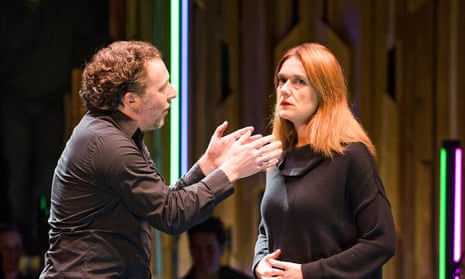Staged concerts, conducted by Simon Rattle and directed by Peter Sellars, have been a feature of Rattle’s years with the Berlin Philharmonic, and it’s clearly a collaboration that’s going to continue when Rattle takes over at the London Symphony Orchestra next year. This semi-staging of Pelléas et Mélisande was clearly a statement of intent, and it’s already been announced that Rattle and Sellars will present Ligeti’s Le Grand Macabre in the same way next season.
Certainly the staging devised for the Barbican – with just a walkway at the front of the stage, one raised platform and some coloured fluorescent tubes arrayed around the orchestra – effectively preserved the musical and dramatic power of Debussy’s symbolist masterpiece intact. Even Sellars’ all too familiar glosses – Magdalena Kožená’s Mélisande had apparently found herself in Allemonde as a refugee, while the sheep in Yniold’s scene in the fourth act became refugees too, with the shepherd as an officious border guard – were less intrusive than they can be, though portraying Christian Gerhaher’s Pelléas as withdrawn and damaged until his emotions are unlocked by his love for Mélisande, was hard to explain.
What gave the evening such power, though, were the musical performances, even if the text was not always as clear as it might have been. The inflections and colours of the French language are so embedded in Debussy’s vocal lines that Francophone singers always have the edge in this opera.
Here only the Golaud, Gerald Finley, who was born in Montreal, could claim any such connection, and it showed: Finley’s diction was immaculate, all of a piece with what was an outstanding, sometimes terrifying portrayal of this appallingly conflicted man. Much of Kožená’s acting was compelling but her way with the words was much less convincing, and even the clarity of Gerhaher’s singing came and went, despite the craft and colour he brought to every phrase.
It is a work that brings the best out of Rattle as an opera conductor too.
With the orchestra onstage behind the singers, the play of colours between voices and instruments was wonderfully subtle, and the great climaxes, as much as the ebbing away of the final scene (better judged and more intensely moving than I’ve ever known it before) had exactly the right scale. The stature of Pelléas et Mélisande as one of the greatest of all operas was never in doubt, and the performance was dedicated to the memory of Pierre Boulez, who worked regularly with the LSO over almost half a century, and was a mentor to the young Rattle; Pelléas was also the only staged opera that he ever conducted in Britain.

Comments (…)
Sign in or create your Guardian account to join the discussion